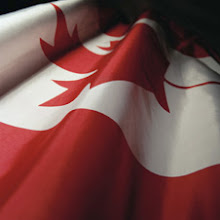human rights and same-sex unions (part 1)
BACKGROUND:
According to an article on CBC.ca entitled, "The Supreme Court and Same Sex Marriage" (June 29, 2005) and with additional information from articles on same-sex rights (cf. "Canada Timeline") and The Prime Ministers of Canada website, the transition of decriminalising homosexuality was taken in 1969 under then Prime Minister Pierre Trudeau of the Liberal Party; ten years later (1979), Toronto observed its first Gay Pride Day.
On July 12, 2002, the Ontario Superior Court ruled that denying same-sex couples from marrying is unconstitutional; in contrast, Alberta bans same-sex marriage and stands by the definition of marriage as being between a male and a female. (Now take notice of how the Liberal Party works around this argument in response!) On June 17, 2003, the Prime Minister at that time, Jean Chretien of the Liberal Party, sought to legalise same-sex unions; in just over two years (July 20, 2005) Chretien and his Liberal Party succeeded in legalising same-sex unions. Shortly thereafter, they also sought and succeeded in redefining the meaning of marriage for all Canadians (most evident in the Canadian Oxford Dictionary, though rejected by the province of Alberta, many Christians, Muslims, etc.), thus allowing these now lawful same-sex unions in Canada to be recognised as same-sex 'marriages'. According to these rulings, the Supreme Court in Canada also added (Dec 9th, 2004) that religious groups are not obliged to perform these unions or 'marriages' if it runs contrary to their beliefs. Interestingly enough, the first same-sex separation occured within a week of the legalisation of same-sex unions, which then ended in divorce a year later (cf. "Same-Sex Divorce").
On the other side of the fence, recommendations for changes in the Canadian Human Rights Act to make it illegal to discriminate against people regardless of sexual orientation was recommended by the Parlaimentary Committee on Equality Rights; in March 1986, then Prime Minister Brian Mulroney of the Progressive Conservative Party, agreed to prohibit such discrimination in relation to all areas of federal jurisdiction. This then led to court battles between individuals who felt discriminated in certain provinces, but inconsistency between individual rights in areas of provincial jurisdiction and areas of federal jurisdiction forced many of these cases to be addressed and resolved in the Supreme Court of Canada. In 1992, then Justice Minister (and later Prime Minister) Kim Campbell of the Progressive Conservative Party, announced and later released Bill 108 which added "sexual orientation" to the Canadian Human Rights Act; but this was rejected and didn't make a re-appearance until Bill C-33 in 1996 (under Jean Chretien of the Liberal Party).
RECENT DEVELOPMENTS:
More recently, Alberta's (Conservative) provincial government sought to provide additional protection for the rights and freedoms of religious groups and individuals who refuse to provide same-sex marriages on the basis of their beliefs; this Bill, written by Dr. Ted Morton, is known as Bill 208. Whether or not this Bill, which is supported by the current minority Conservative government under Prime Minister Stephen Harper, is restricted to Alberta or will be Canada-wide is unknown to me. However, in addition to respecting the religious beliefs, rights and freedoms of those who disagree with same-sex marriage and/or the act of homosexuality itself, this Bill also provides children of those parents (or legal guardians) with similar respect, rights and freedoms by not forcing same-sex / homosexual material to be taught to them (i.e., children) without the consent of their parents (or legal guardians), and by not penalising those children for not learning that material. What's important to note is that this Bill in no way forbids the teaching of this material in the public classroom setting (thus it does not violate the rights and freedoms of anyone whose religious beliefs are silent or permissive of this material), but it does protect the religious beliefs, rights and freedoms of those whose beliefs are contrary to these things.
In response to this Bill, Opposition leaders and same-sex rights advocates condemn Bill 208 as being discriminatory (cf. "Alberta Same-Sex Bill Blocked by Opposition").
Ironically, it seems that the opposite is true: To force anyone, regardless of their age, to be subjected to something contrary to their religious beliefs and against their will, the will of their parents or legal guardian, is nothing less than discriminatory, a violation of their rights and freedoms (in accord with the established Canadian Law), and a tyranical attempt to force their own unwanted beliefs and practices upon another. Such force is unwarranted, especially in a country where rights and freedoms allow for same-sex marriage as well as the means (through others who are not bound by religious convictions to the contrary) by which same-sex marriages can be conducted. Likewise, the teaching in public schools is not forbidden; thus, the rights and freedoms of those who do not hold religious convictions contrary to same-sex discussions can freely learn about these matters in class, while the rights and freedoms of those having religious convictions contrary to such matters are also protected from such things by being excused from attending class at those times (and from being tested on those matters at any time). Of course, teachers who are determined to speak about same-sex orientation on a daily basis, as a subtle means of abusing the beliefs, rights and freedoms of children so that their parents (or legal guardians) must make a decision of either not having their child attend that class or exposing their children to same-sex teachings that are contrary to their religious beliefs doesn't seem to be addressed at all in Bill 208.
So now the question I present to you is this: What are your thoughts on same-sex marriage, same-sex education in public schools, and Bill 208's attempt to protect the rights and freedoms of people (and their children) from being forced to do or learn something contrary to their religious beliefs? When it comes to human rights and freedoms in this matter, who should prevail and why?
- Roger

